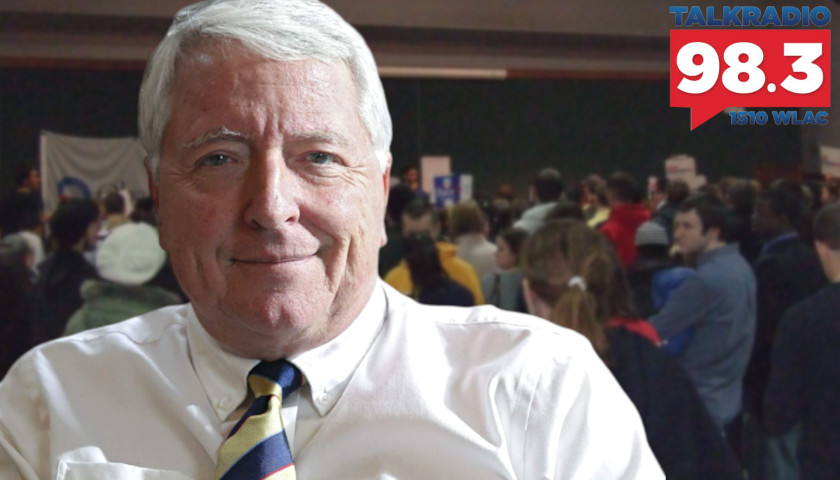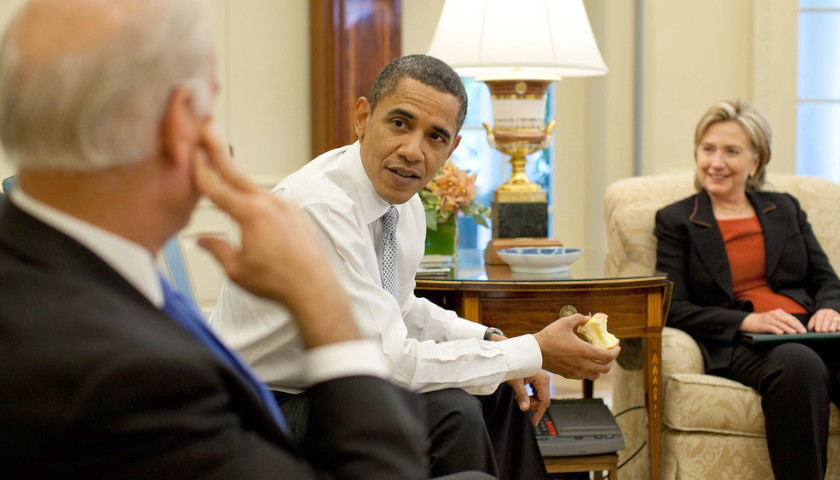On Friday’s Tennessee Star Report with Michael Patrick Leahy – broadcast on Nashville’s Talk Radio 98.3 and 1510 WLAC weekdays from 5:00 am to 8:00 am from the historic WHO radio studios in Des Moines, Iowa – Leahy was joined in studio with good friend and famed Iowan attorney Jim Larew to continue their discussion on the historical mechanics of the Iowa caucus.
Towards the middle of the segment, Larew and Leahy discussed a few of the key players in molding the political dynamics in the Iowa caucus by citing Harold Hughes in a particular. “And Hughes’s insistence that we have new procedures and processes that would allow the cream to come to the top I think was a moral imperative. And the reform required that people be allowed to express themselves. That you do not have the unit rule. You do not have unit bosses controlling the outcome,” said Larew.
Leahy: In the studio with me my good friend Jim Larew. A life long democrat. Knows Iowa backward and forwards. Welcome, Jim.
Larew: Nice to be here with you Michael.
Leahy: We were talking about why Iowa. Why is Iowa the first in the nation you’ve explained it a little bit and the presidential selection process? Tell us your experience in the very first caucus that you were involved in here in 1976.
Larew: Well, the first caucuses were ’72. And that was the result. The fact that we’re first in the nation. It’s a combination of history and personalities. And it goes back to the ’78 convention.
Leahy: ’68 convention.
Larew: The 68 convention.
Leahy: The one in Chicago where the whole world is watching! The whole world’s watching!
Larew: That’s right.
Leahy: Protestors in the street. Fighting the police officers of Chicago. Richard Daly the political boss and Mayor of Chicago flipping the board to national cameras.
Larew: All of that happened. And the party selected Hubert Humphrey who had not entered in one primary. It was clearly the old bulls of the party were in control of the process.
Leahy: Hubert Horatio Humphrey.
Larew: That’s right. And you had part of the Democrats. Eugene McCarthy had challenged the war policy of Lyndon Johnson. The person who nominated on the floor of the convention, Eugene McCarthy was an Iowa politician, Harold E. Hughes.
Leahy: Harold Hughes. Yes! I remember him. He had a deep voice. Black hair. He looked like a preacher of old.
Larew: He was the most charismatic politician of either party in Iowa in the centuries time. His biography is small-time, Ida Grove, truck diver. Alcoholic. Someone who pulled himself out of the stoopers of a low point in life to become this magnificent orator.
Leahy: A fabulous orator. A classic stemwinder.
Larew: Absolutely. He made it respectable to be a Democrat in Iowa. If not for a century than possible to be that if you were respectable and you wanted to go into politics you did so as a Republican. His own experience in life had been because he was so charismatic that you don’t have political machines.
You don’t have bosses. You just go out and let the cream rise to the top. After that ’68 disaster, there was something called the McGovern Frasier Commission.
Leahy: Yeah. I remember it.
Larew: Senator Harris from Oklahoma appointed, he was then the Democratic chair, he appointed a 28 member commission. It was named for George McGovern and Donald Frasier the two co-chairman. The moral force was in that 28 member group was Harold Hughes in my opinion.
And Hughes’s insistence that we have new procedures and processes that would allow the cream to come to the top I think was a moral imperative. And the reform required that people be allowed to express themselves. That you do not have the unit rule. You do not have unit bosses controlling the outcome.
And the party gave states the opportunity that required one to select delegates. Because that’s what we’re doing. We’re selecting delegates to go to a national convention. And there was some talk at the time, why don’t we just abandoned those and just have a national primary. And the decision was made no.
States should have control over their own nominating processes. But they should be subject to certain minimum criteria that assure that the people of the parties control the party and not the other way around. One of the options for going forward if it wasn’t going to be a form of a primary was the caucus. Not many states do the caucus. It’s a different kind of enterprise.
Leahy: And the caucus is like a primary. Everybody knows a primary. You go to the polls and you look at a ballot and you pick somebody. Everybody gets to vote. But at a caucus, everybody can participate, BUT, tell us what participation in a caucus means? And how many people participate in a caucus.
There’s a different kind of thing. There’s an accountability that is enforced in fact that you go to a public space. Used to be school gyms, now they’re not even large enough. And you go in the presence of your neighbors. A precinct is not very large, you not everyone there, but you know a lot of people in your precinct.
And you make a public act in the presence of those, unlike the secret ballot. And in a period of time, between one and three hours in an evening, you break into groups and make yourself politically accountable for your own acts.
Leahy: So the group you go to is like if you’re going to identify with one particular candidate. All of the Joe Biden people over in this corner. All of the Elizabeth Warren people over in this corner. The Bernie Sanders people. And maybe somebody will be a John Delaney person or a Marianne Williamson person.
Larew: Right. And you physically divide into groups. The doors are locked at 7 pm. No one comes in.
Leahy: They lock the doors! Is it a SCIF? Is it a secure compartmentalized information facility?
Larew: I’m sure that Republican members of congress would find ways to sneak into our caucus and make a big deal of it. But what happens is, it’s a set number because you’ve got, based on percentages. If you don’t have 15%, 15% of those who attend your caucus you have to disband and go somewhere else.
Leahy: So they do a count after some point.
Larew: They do a count.
Leahy: So if you’re a Marianne Williamson person and your in this room with 300 people. And it’s you and one other. The first count is you’re below 15% percent.
Larew: Right.
Leahy: And you got to go to another group.
Larew: You do. You could even go to a group called undecided if there’s 15% undecided. So sometimes in some caucus’s you have a large group of undecideds. And people will wheel and deal and say, ‘If you come over here undecided we will secretly let you be our delegate undecided.’
And you could elect an undecided delegate and people who want to participate ultimately, there are several layers in this process, you end up selected to be a delegate to the Democratic National Convention.
Larew: That’s the ultimate prize. Some more go to the state or the county convention. But there’s a certain number that ultimately goes to the national convention. And it is all based on dis-proportionality and accountability.
There’s a downside to all of this right? One is, what happens to that 15 %? If you disappear, to some people that feels like its a disenfranchisement.
Leahy: Would people like to leave if they’re not in 15%?
Larew: They’re always free to leave, but normally no.
Leahy: Oh, they stick around.
Larew: Absolutely stick it out.
Leahy: Even if their candidate doesn’t make the threshold. They want to have a voice of some sort.
Larew: They do. And they want to make sure the chairman of that caucus is counting the bodies in the right way to make it go. I mean it’s hard to believe a more accountable system but it’s cumbersome.
Listen to the third hour:
– – –
Tune in weekdays from 5:00 – 8:00 am to the Tennessee Star Report with Michael Patrick Leahy on Talk Radio 98.3 FM WLAC 1510. Listen online at iHeart Radio.





